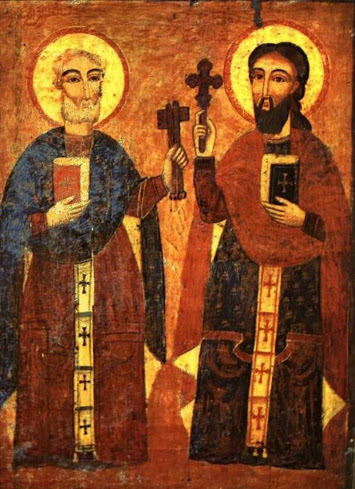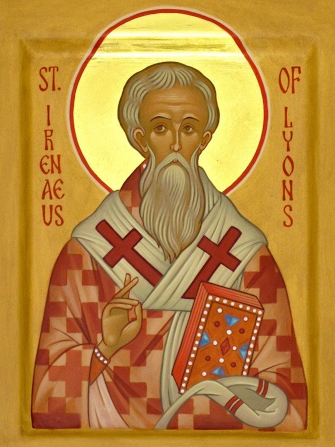John Janaro's Blog, page 94
July 9, 2021
More Texts Without Comment
July 8, 2021
Texts Without Comment
July 7, 2021
Parents and Children
The days are full of memories, as well as present events and promises for the future. Dad and Mom (“Papa and Grandma”) spent nearly all of their adult lives together, and now we prepare to entrust them both to the glory of God’s everlasting love.
Here are a few pictures from over the years. Dear beloved parents: we will always be grateful to you for who we are, who our son and daughters (a.k.a. Walter’s “nephew and nieces”) are becoming, and all they will give in turn to their children.
So much is happening, almost simultaneously, it seems. We move "from generation to generation" and it changes us. A new generation is beginning, which makes me want to honor all the more these precious people - my late parents and all our elders - without whom none of us would be here. They have educated us as persons, guided our freedom, contributed to the history of goodness in this world, and empowered us to be creative and - in turn - open new possibilities for those who are entrusted to us.
Rest In Peace, Dad (+2019) and Mom (+2021). God bless our elders, those who have passed on and those who remain in this world. They deserve to be cherished, honored, and loved!
Thank you. We love you!❤❤



July 4, 2021
Mom Goes Home to God
 Our beloved mother, Joan Janaro, passed away peacefully on Saturday evening after a brief illness. She was 82 years old. My brother Walter and I were with her on Saturday, along with Eileen and two of the grandchildren. Father Donald Planty joined us, administered the sacrament of Anointing of the Sick and led us in the prayers for the dying. Now, we pray that the Lord will grant her eternal rest in His infinite mercy and love, and reward her for her long and faithful life of service to Him.✝️
Our beloved mother, Joan Janaro, passed away peacefully on Saturday evening after a brief illness. She was 82 years old. My brother Walter and I were with her on Saturday, along with Eileen and two of the grandchildren. Father Donald Planty joined us, administered the sacrament of Anointing of the Sick and led us in the prayers for the dying. Now, we pray that the Lord will grant her eternal rest in His infinite mercy and love, and reward her for her long and faithful life of service to Him.✝️I will write about Mom at greater length when I am able to do so. She was an extraordinary human being. I don't think I can ever adequately express in words my own love for her and gratitude to her, but I will do my best to say something soon.
We will all miss her very much.
"Our citizenship is in heaven, and from it we also await a savior, the Lord Jesus Christ. He will change our lowly body to conform with his glorified body by the power that enables him also to bring all things into subjection to himself" (Philippians 3:20-21).
July 1, 2021
Saint Junipero Serra: "A Church Which Goes Forth"
 July 1 commemorates Saint Junipero Serra, who founded Misión San Diego on this date in 1769. Pope Francis offered these reflections on Serra's passion for bringing the good news of Jesus Christ to many indigenous peoples of Mexico and California:
July 1 commemorates Saint Junipero Serra, who founded Misión San Diego on this date in 1769. Pope Francis offered these reflections on Serra's passion for bringing the good news of Jesus Christ to many indigenous peoples of Mexico and California:"Jesus said: Go out and tell the good news to everyone. Go out and in my name embrace life as it is, and not as you think it should be. Go out to the highways and byways, go out to tell the good news fearlessly, without prejudice, without superiority, without condescension, to all those who have lost the joy of living. Go out to proclaim the merciful embrace of the Father. Go out to those who are burdened by pain and failure, who feel that their lives are empty, and proclaim the folly of a loving Father who wants to anoint them with the oil of hope, the oil of salvation. Go out to proclaim the good news that error, deceitful illusions and falsehoods do not have the last word in a person’s life. Go out with the ointment which soothes wounds and heals hearts.
"Mission is never the fruit of a perfectly planned program or a well-organized manual. Mission is always the fruit of a life which knows what it is to be found and healed, encountered and forgiven. Mission is born of a constant experience of God’s merciful anointing.
"The Church, the holy People of God, treads the dust-laden paths of history, so often traversed by conflict, injustice and violence, in order to encounter her children, our brothers and sisters. The holy and faithful People of God are not afraid of losing their way; they are afraid of becoming self-enclosed, frozen into élites, clinging to their own security. They know that self-enclosure, in all the many forms it takes, is the cause of so much apathy.
"So let us go out, let us go forth to offer everyone the life of Jesus Christ (Evangelii Gaudium, 49). The People of God can embrace everyone because we are the disciples of the One who knelt before his own to wash their feet (ibid., 24).
"We are here today, we can be here today, because many people wanted to respond to that call. They believed that 'life grows by being given away, and it weakens in isolation and comfort' (Aparecida Document, 360). We are heirs to the bold missionary spirit of so many men and women who preferred not to be 'shut up within structures which give us a false sense of security… within habits which make us feel safe, while at our door people are starving' (Evangelii Gaudium, 49). We are indebted to a tradition, a chain of witnesses who have made it possible for the good news of the Gospel to be, in every generation, both 'good' and 'news'.
"Today we remember one of those witnesses who testified to the joy of the Gospel in these lands, Father Junípero Serra. He was the embodiment of 'a Church which goes forth', a Church which sets out to bring everywhere the reconciling tenderness of God. Junípero Serra left his native land and its way of life. He was excited about blazing trails, going forth to meet many people, learning and valuing their particular customs and ways of life. He learned how to bring to birth and nurture God’s life in the faces of everyone he met; he made them his brothers and sisters. Junípero sought to defend the dignity of the native community, to protect it from those who had mistreated and abused it. Mistreatment and wrongs which today still trouble us, especially because of the hurt which they cause in the lives of many people.
"Father Serra had a motto which inspired his life and work, not just a saying, but above all a reality which shaped the way he lived: siempre adelante! 'Keep moving forward!' For him, this was the way to continue experiencing the joy of the Gospel, to keep his heart from growing numb, from being anesthetized. He kept moving forward, because the Lord was waiting. He kept going, because his brothers and sisters were waiting. He kept going forward to the end of his life. Today, like him, may we be able to say: Forward! Let’s keep moving forward!"
June 30, 2021
Summer Flowers
We end the month of June as we began it, with flowers. We don't have many wild flowers around anymore, but there are some lovely garden flowers visible from the road while walking, or blooming in public parks.
Spring this year was pleasant overall, but the sun has now been high in the sky for weeks and the heat of July is upon us.





June 29, 2021
Peter and Paul, the Church, and Evangelization
 Happy Solemnity of Saints Peter and Paul
. Happy feast day especially to the whole church in Rome, and in particular to the Bishop of Rome — who is entrusted with the Apostolic See, the "Sede" ("chair," representing the episcopal office) of Saint Peter and his successors to this day. The "primacy" of Peter's successor is a reference point for the unity all those who follow Christ in the Church in every time and place. It is a primacy of service and solicitude, as Jesus indicated to Peter when He said, "Feed my sheep."
Happy Solemnity of Saints Peter and Paul
. Happy feast day especially to the whole church in Rome, and in particular to the Bishop of Rome — who is entrusted with the Apostolic See, the "Sede" ("chair," representing the episcopal office) of Saint Peter and his successors to this day. The "primacy" of Peter's successor is a reference point for the unity all those who follow Christ in the Church in every time and place. It is a primacy of service and solicitude, as Jesus indicated to Peter when He said, "Feed my sheep." Also, Rome was the great cosmopolitan center of the ancient world, inhabited and visited by many peoples and known throughout the earth. In Rome, Saint Paul's ministry was thus extended, symbolically, to all the Gentiles, to all peoples. Peter and Paul are signs of the unity and universality of Christ's Church. Their being co-patrons of the Church of Rome indicates that — from the beginning — Jesus Christ is given to the whole world, and to every human being. Saint Paul remains the first evangelizer of the nations, commissioned by Jesus Himself. And Saint Peter — named "the Rock" by Jesus — continues through his successors to fulfill to Lord's special call to “confirm the brethren” in the faith. After 2000 years — and in spite of attacks by enemies, the destructive consequences of tragic misunderstandings, and the shocking criminal behavior of so many of the Church's own members — the "Rock" remains the foundation of an unparalleled "edifice" that endures and grows in history.
The "gates of hell," the "jaws of death" have not prevailed against the Church, the communion of persons in Christ who strive to follow Him and radiate His love in the world, the "flock" that Jesus continues to shepherd by the gift of the Holy Spirit and the leadership of Peter's successors: the bishops of Rome who with filial affection we call "Popes" (from the term "papa," father). We love the Pope, we follow him, and we pray for him. We know well that he is a frail human being like us. In the life of the Church, we are entitled to express our opinions and concerns in a constructive manner. But ultimately we trust in God's ways; we must remain in the vital unity of the Church wherein the truth abides; we must remember — notwithstanding whatever personal weaknesses we may think we see in any particular Pope — that every Pope is called and empowered to act as "the servant of the servants of God."
We trust in the path God has given us, because God is good, and He loves us. The mystery of God's Infinite Love is the secret directing impetus that moves the world, that cares for the heart of every human person, and that illuminates the lives of His People, the Church. God has proven His love for us — for everyone — by sending His Son Jesus to save us from our sins, to redeem us and transform us in His likeness.
Like Saints Peter and Paul, we too are members of the Church established by the loving Heart of Jesus. The love of this man — this man who alone "knows the Father," who is God the Son, the Word made flesh — this man Jesus Christ, the Son of Mary, who lived in first century Palestine, who was crucified and died and conquered death forever in His resurrection: this man Jesus Christ touched the lives of Peter and Paul, changed them completely, and lit a fire in their hearts that burned so brightly that they couldn't contain it within themselves. They had to share it with everyone. God's love "compelled" them — awakening all the depths of their freedom and liberating them through joy — to be witnesses of Jesus to the whole world.
The same fire burns in the heart of every Christian, even though it is often faint, ill-tended, hidden away in an obscure corner.
We must not extinguish this fire. We must let the breath of the Holy Spirit revive it so that it bursts into a great flame.
June 28, 2021
Saint Irenaeus and the Reality of Jesus Christ
 Today we honor Saint Irenaeus, bishop of Lyons (140 - 202 a.d.), the great witness to Christ in the Church of the late Second Century. Here I reproduce a selection from my book published in 2003 (which is still in print - click HERE for more information). It outlines the pioneering importance of Irenaeus as an ecclesial theologian. (My book is entitled
The Created Person and the Mystery of God
.) The text reproduced below is taken from pp. 204-206:Because Christianity is an adherence to a man in history — to the things he said and did and to the society he constituted — it was crucial from the very beginning to receive and preserve the authentic testimony of those He sent forth to bear witness to His name. Thus the measure of genuine Christian thinking and the anecdote to every poisonous distortion of the Christian message could only be fidelity to the apostolic tradition. It was this fidelity that both guided and rendered fruitful the great work of Saint Irenaeus at the end of the second century.
Today we honor Saint Irenaeus, bishop of Lyons (140 - 202 a.d.), the great witness to Christ in the Church of the late Second Century. Here I reproduce a selection from my book published in 2003 (which is still in print - click HERE for more information). It outlines the pioneering importance of Irenaeus as an ecclesial theologian. (My book is entitled
The Created Person and the Mystery of God
.) The text reproduced below is taken from pp. 204-206:Because Christianity is an adherence to a man in history — to the things he said and did and to the society he constituted — it was crucial from the very beginning to receive and preserve the authentic testimony of those He sent forth to bear witness to His name. Thus the measure of genuine Christian thinking and the anecdote to every poisonous distortion of the Christian message could only be fidelity to the apostolic tradition. It was this fidelity that both guided and rendered fruitful the great work of Saint Irenaeus at the end of the second century.
Irenaeus was born in Asia Minor around 140 a.d. In his youth, he was a disciple of Saint Polycarp of Smyrna, who in turn had been a follower of Saint John the Apostle. Thus he had a vital, personal link to the "handing on" of the truth about Jesus Christ from those who knew Him and were commissioned to be His witnesses.
Irenaeus travelled to Rome and to Southern Gaul and eventually became bishop in the city of Lyons. In Rome he first encountered the strange phenomenon of "Christian Gnosticism," and he battled against it throughout most of his episcopal ministry in Lyons. Many Christians in Rome in the middle of the second century had become captivated by the theories of a charismatic preacher named Valentinus. After an unsuccessful attempt to get himself elected pope in 140, Valentinus broke openly from the Church and began to develop his own Christian gnostic sect. The general tendencies of the gnostic movement — its stress on esoteric and secret wisdom, its radical dualism between spirit and matter, and its hierarchy of divinities — resulted in a very peculiar interpretation of biblical revelation and the life of Jesus Christ.
For Valentinus and his disciples, the God of the Old Testament is not the Ultimate Divine being, but an inferior and rebellious deity who created the material world for his own evil purposes. Another more powerful deity called “Christ" was sent from the pleroma (the "society" of divine beings) to teach the truth and offer deliverance to lesser spirits who were trapped in this material prison. He inhabited the man Jesus — he certainly did not become incarnate — and by this means he taught secret doctrines to his initiates (the apostles). Needless to say, the Christ-deity (being no fool) abandoned the man Jesus before the messiness of the Passion got started.
Behind the crassness and silliness of this highly imaginative distortion of Christianity we can recognize a perennial heretical principle: the denial of the historical drama of the redemption in favor of some purely theoretical or interpretive scheme that supposedly reveals to us the "real" significance of Christ and Christianity. Irenaeus wrote his masterpiece — his treatise Against the Heresies — to combat Valentinianism and other gnosticisms that made their way up the Italian peninsula into Gaul. Throughout this great work, he contrasts the "secret knowledge" of the gnostics with the tradition handed down from the Apostles and preserved in the Church.
Irenaeus stresses the consistency and reliability of this tradition, linked as it is to the real Jesus Christ of history. At the same time he meditates more deeply on the unity of the Divine plan and the centrality of Christ’s redeeming action. It is one God who creates all things visible and invisible and who recreates them in Christ. The world that is created through the agency of the Divine Word is recapitulated — brought again "under the headship" — of the Word made flesh, who, by coming into the world, embraces history and consecrates it to God.
Thus Irenaeus gave eloquent testimony to a theme that was original to Christianity: the unity and purpose of history centered on the Incarnate Word.
Here is a brief quotation from Saint Irenaeus himself:
"We have learned from none others the plan of our salvation, than from those through whom the Gospel has come down to us, which they did at one time proclaim in public, and, at a later period, by the will of God, handed down to us in the Scriptures, to be the ground and pillar of our faith." The witness of the apostolic tradition attests to "the only true and steadfast Teacher, the Word of God, our Lord Jesus Christ, who did, through His transcendent love, become what we are, that He might bring us to be even what He is Himself."
~Saint Irenaeus
June 25, 2021
“Mahwidge is What Bwings Us Together...”
 Okay, the "Princess-Bride-reference" is the closest I will go in terms of "clickbait"(😉).
Okay, the "Princess-Bride-reference" is the closest I will go in terms of "clickbait"(😉). As you all know, Eileen and I celebrated our 25th wedding anniversary this week. Of course, we have been (and will be) stretching out our Silver Jubilee all through this memorable year. It has been a special time for us, with a renewed awareness of the preciousness of our life together and all we have shared, as well as a renewed commitment to what lies ahead. We are moving forward with hope to the joys, trials, twists and turns, new challenges, surprises, failures, achievements, and growing in love that remain ahead of us as we continue together our journey through this world, following our common vocation.
Marriage is indeed what "brings us together" - it is the unique lifelong bond of love that bears fruit by bringing forth into the world and fostering the personal growth of the next generation, thus insuring the continuation and development of human history. No form of artificially constructed material, technological power can ever begin to replace the original "organic" reality of the human family as the foundation of interpersonal communion, the authentic love that brings genuine flourishing to human persons and human society.
Well..that statement is true and important, but too abstract for this post. These days I'm meditating very much on a particular marriage that has brought two very particular people together, and kept them together for a quarter of a century. Perhaps I could share a few of those reflections.
There are a lot of small practical moments in a life together, and some big moments (wonderful moments and difficult moments). And while marriage will always be about a man and a woman loving each other and being faithful to each other (the mutual "I-Thou" dimension), it is also about their unique solidarity, their being-together as a unity-of-two who engage the world together (the "We" dimension). The fruitful openness of mutual love unfolds along this common path. Recall that the wedding vows make much reference to the various conditions of our mutual life: "for better and for worse, for richer or poorer, in sickness and in health."
Eileen and I have learned the importance of these promises. Our marriage has involved a lot of facing circumstances together, including problems that life has given us that were not the fault of either of us: my illnesses and early 'retirement,' the financial crash of 2008 and the burdens it placed on us, the needs of our aging parents, the dementia and loss of my Dad, the now-failing health of my Mom... and many ongoing challenges. It’s always messy, and we learn and grow by going through things, by struggling and enduring, by not giving up, and by forgiving each other every day.
Eileen and I have been greatly blessed. We still love each other and trust each other, and we have had lots of support from others in difficult times. Certainly, people hope to find deep affection for each other in marriage, but (as is to some extent the case with all human relationships) the unique spousal-interpersonal affection in married life is more complicated (and sometimes more arduous) than initial experiences might suggest.
Affection goes through many phases over time, and it's all too easy for married couples to give up and grow distant when the early and initial stages of affection and intimacy (with their particular type of intensity) seem to fade. It's true that "people change" over the years and decades, but this underscores the importance of humility, fidelity, and the realization that spouses are not meant to be the ultimate fulfillment of each other. Marriage is a sign - a great sign - of the ultimate destiny for which the spouses have been made, toward which they journey together, and which their being-together helps them to remember. This doesn't diminish spousal love and affection, but actually renews and deepens them. Even as many forms of feelings ebb and flow, affection can grow and be rediscovered, and even open up in new and more beautiful ways. This has certainly been our experience.
When feelings of estrangement begin to creep in, don't give up! Be patient, forgive one another, and "begin again" each day. A marriage can do more than just survive; of itself it has great resilience and remarkable resevoirs of vitality. Don't give up.
One thing Eileen and I have been grateful for is that we have always been genuinely good friends. We love to do things together, but we have our own interests too. It’s not an identical “match,” which is just fine. We can appreciate one another’s interests and learn from one another, but also share the things we love together. Real intimacy includes “space” because it’s not absorption. It's a union of two persons. At the same time, the "space" I'm talking about here is not meant to imply a merely “partial union,” but rather a union of persons precisely with their distinct personalities: a union of persons who grow together and challenge one another (or, often, frustrate one another — but here again there is forgiveness).
And of course, there are the kids. What a mystery it is to be parents. It “fills” our relationship (because, after all, God created them and gave each of them their unique personal identity through us!) - but here too, parenthood doesn’t “negate” our own personalities. It enriches us and our spousal relationship further. Once again, we find that family is a unity of persons; with all the particular responsibilities it places on parents at the beginning, it nevertheless must always include freedom. We have loved our kids like crazy, like I can’t describe, but we know that they were entrusted to us (as parents) for a truly personal education, an education of their freedom, of their hearts, of their own personal capacity to love and to be loved and to find fulfillment in the Mystery to whom we all belong.
I’m grateful that Eileen and I have worked together with the kids, and faced their problems together. Of course, we're not finished with the initial (and most directly educative) stage of parenthood. We still have two teenagers in the house, and I think they are both more challenging (in different ways) than the other three who are grown up. (Or maybe we're just older and less energetic than we used to be.) But we have more experience, and have become wiser and more realistic about our efforts and limitations. We still make mistakes, and still need their forgiveness.
The wonder is that I am a unique person, but at the same time relationships with other persons are intrinsic to “who I am.” I become more truly myself by engaging these persons who have been entrusted to me with love, which means giving of self (and receptivity to the gift of the other). Love is a sacrifice, but we don’t give ourselves away into a void. Love is not nihilism. It is self-giving and even “losing one’s self” but with a promise of finding one’s self, of renewal, of freedom in love.
After 25 years with my beloved wife, I see the truth of this in so many ways. Even our mistakes and failures toward each other are turned toward something greater (again, with forgiveness). Forgiveness is at the heart of the mystery of marriage, and this has to do with the fact that it is a special living sign of God's compassionate love for the human beings He has created. For Christians, it is a Sacrament wherein Jesus Christ's forgiving, crucified love for His bride, the Church, takes concrete shape and efficacy through the relationship of spouses, and becomes radically present and directive of marital fruitfulness in families, which are the continuation of history, and the "school" for the ongoing experience and expansion of His love from generation to generation.
We are confident that God continues to carry out His mysterious plan for us to grow in love. God is always good. Sometimes it can take awhile to “see” this goodness (or even a glimpse of it) in our lives. But we know He has accomplished all things in Jesus Christ. He will never fail us. There have been times, and there will be times, when He seems distant or we are stretched beyond anything we ever imagined. But His strength prevails in our weakness. We have to trust Him. We have to hold onto Him, together.
We still have a lot to learn. 25 years is hardly a lifetime. In any case, in marriage there are always surprises. Within a week or two (or even sooner) we will see the face of our granddaughter for the first time. GRANDPARENTS!!? A brand new adventure begins! We can’t imagine it. We’re so excited!!
June 22, 2021
An Amazing 25 Years (!)
Twenty five years married to this wonderful lady, Eileen Janaro. So grateful! ❤
#SilverWeddingAnniversary









